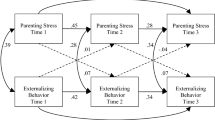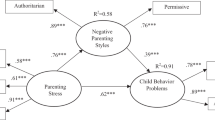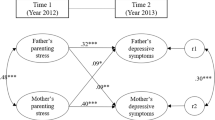Abstract
Although considerable research has investigated parenting stress and children’s externalizing behavior problems, comparatively less has considered parenting stress in relation to children’s internalizing difficulties. Even less research on parenting stress has incorporated children’s report of their internalizing symptoms or the potential mediating role of children’s attributional style. The current study hypothesized that children’s independent reports of internalizing symptoms would be associated with mothers’ reports of parenting stress through children’s attributional style. A community sample of 92 mother–child dyads participated. Results suggest maternal parenting stress from both child and parent sources were significantly associated with children’s anxious and depressive symptoms. Parenting stress was associated with children’s internalizing symptoms partially mediated by children’s maladaptive attributional style, primarily negative attributions for positive outcomes. Findings are discussed in terms of future directions to tease apart specific areas of parenting stress that may be most pertinent as well as to explore other cognitive mechanisms in children that may relate to parenting stress and children’s adjustment.

Similar content being viewed by others
References
Abidin, R. R. (1992). The determinants of parenting behavior. Journal of Clinical Child Psychology, 21, 407–412.
Abidin, R. R. (1995). Parenting stress index manual (3rd ed.). Charlottesville, VA: Pediatric Psychology Press.
Abramson, L. Y., Seligman, M. E. P., & Teasdale, J. D. (1978). Learned helplessness in humans: Critique and reformulation. Journal of Abnormal Psychology, 87, 49–74.
Abramson, L. Y., Metalsky, G. I., & Alloy, L. B. (1989). Hopelessness depression: A theory-based subtype of depression. Psychological Review, 96, 358–372.
Achenbach, T. M., & Rescorla, L. A. (2001). Manual for the ASEBA school-age forms and profiles. Burlington, VT: University of Vermont, Research Center for Children, Youth, and Families.
Achenbach, T. M., McConaughy, S. H., & Howell, C. T. (1987). Child/Adolescent behavioral and emotional problems: Implications of cross-informant correlations for situational specificity. Psychological Bulletin, 101, 213–232.
American Psychiatric Association. (2000). Diagnostic and statistical manual of mental disorders (4th ed.). Washington, DC: Author.
Anthony, L. G., Anthony, B. J., Glanville, D. N., Naiman, D. Q., Waanders, C., & Shaffer, S. (2005). The relationship between parenting stress, parenting behaviour and preschoolers’ social competence and behavior problems in the classroom. Infant and Child Development, 14, 133–154.
Aronen, E. T., & Soininen, M. (2000). Childhood depressive symptoms predict psychiatric problems in young adults. Canadian Journal of Psychiatry, 45, 465–470.
Banez, G. A., & Compas, B. E. (1990). Children’s and parents’ daily stressful events and psychological symptoms. Journal of Abnormal Child Psychology, 18, 591–605.
Barry, T. D., Dunlap, S. T., Cotten, S. J., Lochman, J. E., & Wells, K. C. (2005). The influence of maternal stress and distress on disruptive behavior problems in boys. Journal of the American Academy of Child and Adolescent Psychiatry, 44, 265–273.
Bayer, J. K., Sanson, A. V., & Hemphill, S. A. (2006). Parent influences on early childhood internalizing difficulties. Journal of Applied Developmental Psychology, 27, 542–559.
Blader, J. C. (2006). Which family factors predict children’s externalizing behaviors following discharge from psychiatric inpatient treatment? Journal of Child Psychology and Psychiatry, 47, 1133–1142.
Brown, J. D., & Siegel, J. M. (1988). Attributions for negative life events and depression: The role of perceived control. Journal of Personality and Social Psychology, 54, 316–322.
Byrne, B. M. (2001). Structural equation modeling with AMOS: Basic concepts, application, and programming. Mahwah, NJ: Lawrence Erlbaum Associates.
Cicchetti, D., & Toth, S. L. (1998). The development of depression in children and adolescents. American Psychologist, 53, 221–241.
Clarke-Stewart, K. A., Allhusen, V. D., McDowell, D. J., Thelen, L., & Call, J. D. (2003). Identifying psychological problems in young children: How do mothers compare with child psychiatrists? Journal of Applied Developmental Psychology, 23, 589–624.
Costa, N. M., Weems, C. F., Pellerin, K., & Dalton, R. (2006). Parenting stress and childhood psychopathology: An examination of specificity to internalizing and externalizing symptoms. Journal of Psychopathology and Behavioral Assessment, 28, 113–122.
Coyle, J. T., Pine, D. S., Charney, D. S., Lewis, L., Nemeroff, C. B., Carlson, G. A., et al. (2003). Depression and bipolar support alliance consensus statement on the unmet needs in diagnosis and treatment of mood disorders in children and adolescents. Journal of the American Academy of Child and Adolescent Psychiatry, 42, 1494–1503.
Creasey, G. L., & Jarvis, P. A. (1994). Relationships between parenting stress and developmental functioning among 2-year-olds. Infant Behavior and Development, 17, 423–429.
Creasey, G., & Reese, M. (1996). Mothers’ and fathers’ perceptions of parenting hassles: Association with psychological symptoms, nonparenting hassles, and child behavior problems. Journal of Applied Developmental Psychology, 17, 393–406.
Crnic, K. A., Gaze, C., & Hoffman, C. (2005). Cumulative parenting stress across the preschool period: Relations to maternal parenting and child behaviour at age 5. Infant and Child Development, 14, 117–132.
Deater-Deckard, K. (1998). Parenting stress and child adjustment: Some old hypotheses and new questions. Clinical Psychology: Science and Practice, 5, 314–332.
Deater-Deckard, K. (2004). Parenting stress. New Haven: Yale University Press.
Eyberg, S. M., Boggs, S. R., & Rodriguez, C. M. (1992). Relationships between maternal parenting stress and child disruptive behavior. Child and Family Behavior Therapy, 14, 1–9.
Friedlander, S., Traylor, J. A., & Weiss, D. S. (1986). Depressive symptoms and attributional style in children. Personality and Social Psychology Bulletin, 12, 442–453.
Gladstone, T. R. G., & Kaslow, N. J. (1996). Depression and attributions in children and adolescents: A meta-analytic review. Journal of Abnormal Child Psychology, 23, 597–606.
Greenbaum, P. F., Dedrick, R. F., Prange, M. E., & Friedman, R. M. (1994). Parent, teacher, and child ratings of problem behaviors of youngsters with serious emotional disturbances. Psychological Assessment, 6, 141–148.
Hart, M. S., & Kelley, M. L. (2006). Fathers’ and mothers’ work and family issues as related to internalizing and externalizing behavior of children attending day care. Journal of Family Issues, 27, 252–270.
Hartung, C. M., & Widiger, T. A. (1998). Gender differences in the diagnosis of mental disorders: Conclusions and controversies of the DSM-IV. Psychological Bulletin, 123, 260–278.
Kagan, L. J., MacLeod, A. K., & Pote, H. L. (2004). Accessibility of causal explanations for future positive and negative events in adolescents with anxiety and depression. Clinical Psychology and Psychotherapy, 11, 177–186.
Kaslow, N. J., Tanenbaum, R. L., & Seligman, M. E. P. (1978). The KASTAN-R: A children’s attributional style questionnaire (KASTAN-R-CASQ). Unpublished manuscript, University of Pennsylvania, Department of Psychology, Philadelphia.
Kazdin, A. E. (1990). Childhood depression. Journal of Child Psychology and Psychiatry, 31, 121–160.
Kovacs, M. (1983). The children’s depression inventory: A self-rated depression scale for school-aged youngsters. Unpublished manuscript, University of Pittsburgh School of Medicine, Pittsburgh.
Kovacs, M. (1985). The children’s depression inventory (CDI). Psychopharmacology Bulletin, 21, 995–998.
Lau, J. Y. F., Rijsdijk, F., Gregory, A. M., McGuffin, P., & Eley, T. C. (2007). Pathways to childhood depressive symptoms: The role of social, cognitive, and genetic risk factors. Developmental Psychology, 43, 1402–1414.
Loeber, R. (1991). Antisocial behaviour: More enduring than changeable? Journal of the American Academy of Child and Adolescent Psychiatry, 30, 393–397.
Luten, A. G., Ralph, J. A., & Mineka, S. (1997). Pessimistic attributional style: Is it specific to depression versus anxiety versus negative affect? Behaviour Research and Therapy, 35, 703–7119.
Marchand, J. F., Schedler, S., & Wagstaff, D. A. (2004). The role of parents’ attachment orientations, depressive symptoms, and conflict behaviors in children’s externalizing and internalizing behavior problems. Early Childhood Research Quarterly, 19, 449–462.
Mesman, J., & Koot, H. M. (2000). Common and specific correlates of preadolescent internalizing and externalizing psychopathology. Journal of Abnormal Psychology, 109, 428–437.
Nolen-Hoeksema, S., Girgus, J. S., & Seligman, M. E. P. (1992). Predictors and consequences of childhood depressive symptoms: A five-year longitudinal study. Journal of Abnormal Psychology, 101, 405–422.
Renk, K., Roddenberry, A., Oliveros, A., & Sieger, K. (2007). The relationship of maternal characteristics and perceptions of children to children’s emotional and behavioral problems. Child and Family Behavior Therapy, 29, 37–57.
Reynolds, C. R. (1982). Convergent and divergent validity of the revised children’s manifest anxiety scale. Educational and Psychological Measurement, 42, 1205–1211.
Reynolds, C. R., & Richmond, B. O. (1978). What I think and feel: A revised measure of children’s manifest anxiety. Journal of Abnormal Child Psychology, 6, 271–280.
Reynolds, C. R., & Richmond, B. O. (1985). Revised children’s manifest anxiety scale (CMAS) manual. Los Angeles: Western Psychological Services.
Saylor, C. F., Finch, A. J., Spirito, A., & Bennett, B. (1984). The children’s depression inventory: A systematic evaluation of psychometric properties. Journal of Consulting and Clinical Psychology, 52, 955–967.
Seligman, M. E. P., Peterson, C., Kaslow, N. J., Tanenbaum, R. L., Alloy, L. B., & Abramson, L. Y. (1984). Attributional style and depressive symptoms among children. Journal of Abnormal Psychology, 93, 235–238.
Semrud-Clikeman, M., Bennett, L., & Guli, L. (2003). Assessment of childhood depression. In C. R. Reynolds & R. W. Kamphaus (Eds.), Handbook of psychological assessment of children: Personality, behavior, and context (2nd ed., pp. 259–290). New York: Guilford.
Smucker, M. R., Craighead, W. E., Craighead, L. W., & Green, B. J. (1986). Normative and reliability data for the children’s depression inventory. Journal of Abnormal Child Psychology, 14, 25–40.
Tabachnick, B. G., & Fidell, L. S. (1996). Using multivariate statistics (3rd ed.). New York: Harper Collins.
Thompson, M., Kaslow, N. J., Weiss, B., & Nolen-Hoeksema, S. (1998). Children’s attributional style questionnaire-revised: Psychometric examination. Psychological Assessment, 10, 166–170.
Williford, A., Calkins, S. D., & Keane, S. P. (2007). Predicting change in parenting stress across early childhood: Child and maternal factors. Journal of Abnormal Child Psychology, 35, 251–263.
Author information
Authors and Affiliations
Corresponding author
Rights and permissions
About this article
Cite this article
Rodriguez, C.M. Association Between Independent Reports of Maternal Parenting Stress and Children’s Internalizing Symptomatology. J Child Fam Stud 20, 631–639 (2011). https://doi.org/10.1007/s10826-010-9438-8
Published:
Issue Date:
DOI: https://doi.org/10.1007/s10826-010-9438-8




